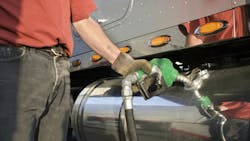Fuel risk management is a critical component of fleet operations, focusing on strategies to control and reduce the costs and risks associated with fuel consumption. This is often a new concept for fleet operators that combines telematics data, fuel management, fraud prevention technologies, and real-time accounting.
For fleet managers, fuel is one of the most significant operating expenses, making effective management vital for profitability and efficiency. This article explores the core aspects of fuel risk management, the tools and platforms available, and best practices for optimizing fuel use in fleet operations.
Basics of fuel risk management
Fuel risk management involves a combination of monitoring, controlling, and optimizing fuel consumption and costs within a fleet.
The main goal is to minimize fuel expenses, reduce the risk of fraud or misuse, ensure compliance with organizational policies, and enhance overall operational efficiency. Effective fuel management helps companies reduce costs, increase revenues, and make data-driven decisions for the company itself.
Key components of fuel risk management
- Data collection and analysis: Modern fuel risk management relies heavily on data. Collecting detailed information on fuel purchases, consumption patterns, vehicle performance, and driver behavior is crucial. This data is then analyzed to identify trends, anomalies, and areas for improvement. The integration of telematics and GPS data can provide deeper insights into fuel use, such as identifying inefficient routes or driving behaviors that lead to excessive fuel consumption.
- Expense monitoring and control: Managing fuel expenses requires setting up controls to ensure that fuel purchases align with company policies. This includes setting limits on fuel spending, restricting purchases to specific types of fuel, and defining acceptable fueling locations. Advanced fuel management platforms provide tools for real-time monitoring and alerts, which can help fleet managers quickly identify and address unauthorized transactions or deviations from policy.
- Fraud prevention: Fuel fraud can take many forms, such as unauthorized fuel purchases, fuel theft, and altered receipts. A robust fuel risk management strategy includes measures to prevent fraud, such as using secure payment methods, monitoring transaction data for irregularities, and implementing strict audit trails. Modern fuel cards and management platforms use technologies like PIN protection, geofencing, and transaction alerts to detect and prevent fraudulent activities.
- Optimization of fuel purchasing: Fuel prices fluctuate due to various factors, including market conditions, supply chain disruptions, and geopolitical events. Fleet managers can mitigate price volatility risks by using fuel management strategies that include bulk purchasing agreements, fuel hedging, and leveraging fuel price analytics to determine the best times and locations for purchasing fuel.
- Driver behavior management: Drivers play a significant role in fuel efficiency. Factors like speeding, idling, harsh braking, and rapid acceleration can significantly impact fuel consumption. Effective fuel risk management includes training and incentivizing drivers to adopt fuel-efficient driving practices. Telematics systems can provide feedback to drivers in real-time, promoting behaviors that contribute to lower fuel consumption.
See also: RoadFlex unveils fuel risk management platform to eliminate fuel theft and fraud for fleets
Tools and platforms for fuel risk management
Fuel risk management involves the use of automation, advanced reporting, and fleet analytics.
There are two primary tools that are used for fuel risk management:
- Telematics systems: Telematics integrates GPS technology with onboard diagnostics to monitor vehicle movements, performance, and fuel consumption. This data helps fleet managers optimize routes, reduce idle time, and ensure vehicles are operating efficiently.
- Modern fuel management platforms: These are advanced platforms that already have an integrated fuel card combined with data from telematics, accounting, and other fleet management systems. They provide real-time insights into fuel usage, automated reporting, advanced analytics, and fraud detection tools. These platforms often support features like geofencing, predictive maintenance alerts, and automated compliance reporting.
Best practices for effective fuel risk management
To maximize the benefits of fuel risk management, fleet managers should consider the following best practices:
- Adopt a data-driven approach: Leverage data analytics to understand fuel consumption patterns, identify inefficiencies, and make informed decisions. Regularly reviewing fuel data helps in setting achievable goals for cost savings and efficiency improvements.
- Implement stringent controls: Use fuel cards with robust controls, set spending limits, restrict fueling times and locations, and regularly audit fuel transactions to prevent misuse or fraud.
- Train and incentivize drivers: Educate drivers on the importance of fuel efficiency and provide incentives for fuel-efficient driving behaviors. Use telematics data to provide feedback and coaching to drivers.
- Regularly review and update policies: As new technologies and market conditions evolve, so should fuel management policies. Regularly review and update policies to incorporate new tools, address emerging risks, and align with organizational goals.
Fuel risk management is an essential aspect of fleet operations that goes beyond just tracking fuel expenses. It involves a comprehensive strategy that integrates data analytics, fraud prevention, driver behavior management, and advanced digital tools.
By adopting a proactive approach and utilizing modern platforms, fleet managers can significantly reduce fuel costs, enhance operational efficiency, and mitigate risks associated with fuel consumption.
About the Author

Rush Akin
Rush is an experienced veteran in the fleet industry, with over 20 years of experience in fleet management. Before joining RoadFlex, Rush served as the SVP of sales for Solera, where he was in charge of overseeing fleet sales and business development in North America. Prior to Solera, Rush worked with well-known brands in the industry, such as Rand McNally, Lytx, FourKytes, and Syntech Systems Fuel Master. Rush has a strong background in fleet and fuel management, as well as customer success.
